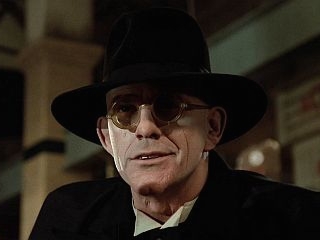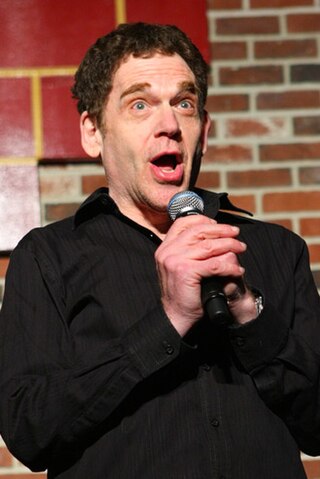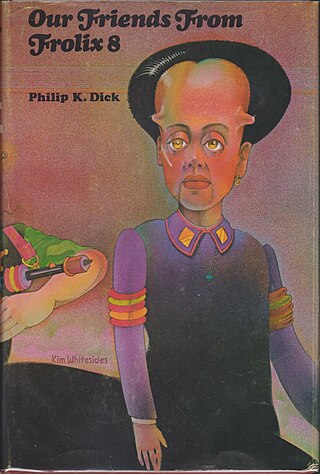Related Research Articles

Who Framed Roger Rabbit is a 1988 American fantasy comedy film directed by Robert Zemeckis from a screenplay written by Jeffrey Price and Peter S. Seaman. It is loosely based on the 1981 novel Who Censored Roger Rabbit? by Gary K. Wolf. The film stars Bob Hoskins, Christopher Lloyd, Stubby Kaye, Joanna Cassidy, and the voices of Charles Fleischer and an uncredited Kathleen Turner. Combining live-action and animation, the film is set in an alternate history Hollywood in 1947, where humans and cartoon characters co-exist. Its plot follows Eddie Valiant, a private investigator with a grudge against toons, who must help exonerate Roger Rabbit, a toon framed for murder.

Earlville is a city in LaSalle County, Illinois, United States. The population was 1,613 at the 2020 census, down from 1,701 at the 2010 census. The city is part of the Ottawa, IL Micropolitan Statistical Area.

Live action is a form of cinematography or videography that uses photography instead of animation. Some works combine live action with animation to create a live-action animated feature film. Live action is used to define film, video games or similar visual media. Photorealistic animation, particularly modern computer animation, is sometimes erroneously described as "live action", as in the case of some media reports about Disney's remake of the traditionally animated The Lion King from 1994. According to the Cambridge English Dictionary, live action involves "real people or animals, not models, or images that are drawn, or produced by computer".

Who Censored Roger Rabbit? is a fantasy mystery novel written by Gary K. Wolf in 1981. It was later adapted by Disney and Amblin Entertainment into the critically acclaimed 1988 film Who Framed Roger Rabbit.
In various works of speculative fiction, a portable hole is a two-dimensional device that can be used to contravene the laws of physics by creating a passage through a solid surface, through which characters can move.

Judge Doom is a fictional character and the main antagonist in the 1988 film Who Framed Roger Rabbit, portrayed by Christopher Lloyd. He is depicted as the much-feared, cruel, and evil judge of Toontown, who later in the film is revealed as the mastermind behind the framing of the titular character and the murder of protagonist Eddie Valiant's brother.

Charles Fleischer is an American actor, stand-up comedian, musician, and writer, best known for appearing in films such as Who Framed Roger Rabbit, A Nightmare on Elm Street, The Polar Express, Rango, Chip 'n Dale: Rescue Rangers, and We're Back! A Dinosaur's Story. He made a cameo in Back to the Future Part II and also reprised the role of Roger Rabbit in the Roger Rabbit theatrical shorts. After beginning his career on the comedy club circuit, Charles Fleischer's first big break in comedy television came when he made an appearance on Rowan & Martin's Laugh-In.

The Amityville Horror is a 1979 American supernatural horror film directed by Stuart Rosenberg, and starring James Brolin, Margot Kidder, and Rod Steiger. The film follows a young couple who purchase a home haunted by combative supernatural forces. It is based on Jay Anson's 1977 book of the same name, which documented the alleged paranormal experiences of the Lutz family who briefly resided in the Amityville, New York home where Ronald DeFeo Jr. committed the mass murder of his family in 1974. It is the first entry in the long-running Amityville Horror film series, and was remade in 2005.

Roger Rabbit's Car Toon Spin is a dark ride located at the Disneyland and Tokyo Disneyland theme parks, based on the 1988 Disney/Amblin film Who Framed Roger Rabbit. Both versions of the attraction are located in Mickey's Toontown. The Disneyland version opened on January 26, 1994, a year after the Mickey's Toontown area opened, and the Tokyo Disneyland version opened on April 15, 1996. In December 2021, the Disneyland version was updated to include a new plot element of Jessica Rabbit in the role of a detective who is determined to stop a crime wave in Toontown.

Our Friends from Frolix 8 is a 1970 science fiction novel by American writer Philip K. Dick. The novel is set in the 22nd century, where humanity is ruled by mutated humans, "New Men" and "Unusuals", while normal "Old Men" are discriminated against. The story follows Nick Appleton, a low-class worker who falls in love with a subversive agent, while Thors Provoni has gone deep into space to find an ally to the resistance.

Eddie Valiant is a fictional character and the main protagonist of the novel Who Censored Roger Rabbit?, and the film adaptation, Who Framed Roger Rabbit.

The concepts of space stations and space habitats feature in science fiction. The difference between the two is that habitats are larger and more complex structures intended as permanent homes for substantial populations, but the line between the two is fuzzy with significant overlap and the term space station is sometimes used for both concepts. The first such artificial satellite in fiction was Edward Everett Hale's "The Brick Moon" in 1869, a sphere of bricks 61 meters across accidentally launched into orbit around the Earth with people still onboard.

Powwow Highway is a 1989 comedy-drama film from George Harrison's HandMade Films Company, directed by Jonathan Wacks. Based on the novel Powwow Highway by David Seals, it features A Martinez, Gary Farmer, Joanelle Romero and Amanda Wyss. Wes Studi and Graham Greene, who were relatively unknown actors at the time, have small supporting roles.

Who Framed Roger Rabbit is a media franchise owned by The Walt Disney Company and Amblin Entertainment, that began with the 1988 film, Who Framed Roger Rabbit, itself based on a book titled Who Censored Roger Rabbit? by Gary K. Wolf.
Roger Rabbit is the title character in the fantasy comedy film, Who Framed Roger Rabbit (1988), directed by Robert Zemeckis.

Jessica Rabbit is a fictional character in the novel Who Censored Roger Rabbit? and its film adaptation, Who Framed Roger Rabbit. She is depicted as the human toon wife of Roger Rabbit in various Roger Rabbit media. Jessica is renowned as one of the best-known sex symbols in animation. She is remembered for the line: "I'm not bad, I'm just drawn that way."
Guy Anthony De Marco is an American author, musician, programmer and teacher.
The Roger Rabbit shorts are a series of three animated short films produced by Walt Disney Feature Animation from 1989 to 1993. They feature Roger Rabbit, the animated protagonist from Who Framed Roger Rabbit (1988), being enlisted the task of caring for Baby Herman while his mother is absent, resulting in a plot defined by slapstick humor and visual gags. Each short concludes with a sequence involving live-action and animation, where the characters interact with live-action human beings, akin to the 1988 film. Droopy Dog from MGM makes a cameo in all of the shorts.

Roger Rabbit is a fictional animated anthropomorphic rabbit, who first appeared in author Gary K. Wolf's 1981 novel, Who Censored Roger Rabbit? In the book, Roger is second banana in a popular comic strip, "Baby Herman". Roger hires private detective Eddie Valiant to investigate why his employers, the DeGreasy Brothers, have reneged on their promise to give Roger his own strip. When Roger is found murdered in his home, Valiant sets out to look for the killer, with the help of Roger's "doppel".

Pop culture fiction is a genre of fiction where stories are written intentionally to be filled with references from other works and media. Stories in this genre are focused solely on using popular culture references.
References
- ↑ "Internet Speculative Fiction Database on Gary K. Wolf". Internet Speculative Fiction Database. Retrieved 2013-06-26.
- ↑ Kahn, Joseph P. (February 28, 2007). "Intergalactic Allies: 'Roger Rabbit' creator Gary K. Wolf and Archbishop John J. Myers travel back in time and conquer the universe". Boston Globe. Retrieved 22 January 2009.
- ↑ "'Roger Rabbit' creator on display in hometown of Earlville | Local | mywebtimes.com". Archived from the original on 2017-06-20. Retrieved 2017-12-19.
- ↑ Wolf, Gary K. (10 July 2016). The Late Great Show!. CreateSpace Independent Publishing Platform. ISBN 978-1535221313.
- ↑ "Gary K. Wolf: Roger Rabbit Creator and Archbishop of Newark Team up to Write Science Fiction Novel". Science Fiction Writers of America. 13 March 2007. Archived from the original on 1 July 2007. Retrieved 2009-01-22.
- ↑ "Amityville House of Pancakes 3". Creative Guy Publishing. Archived from the original on 2009-03-21. Retrieved 2009-01-22.
- ↑ "Gary K. Wolf". Facebook. Archived from the original on 2022-02-26.
- ↑ Paul Sweeting (February 5, 2004). "Disney, Roger Rabbit author in spat". Video Business. Retrieved November 4, 2008.
- ↑ Jesse Hiestand (March 22, 2005). "Roger Rabbit Animated In Court". AllBusiness.com . Archived from the original on January 8, 2009. Retrieved November 4, 2008.
- ↑ "Disney To Pay Wolf 'Rabbit' Royalties". Billboard. July 5, 2005. Retrieved May 2, 2022.
- ↑ "Mickey Mouse & Roger Rabbit in The Stooge". Dvdizzy. 13 March 2013. Archived from the original on July 28, 2014. Retrieved August 24, 2014.
- ↑ "Roger Rabbit Returns In "Who Wacked Roger Rabbit?"". Cartoon Brew. September 27, 2013.